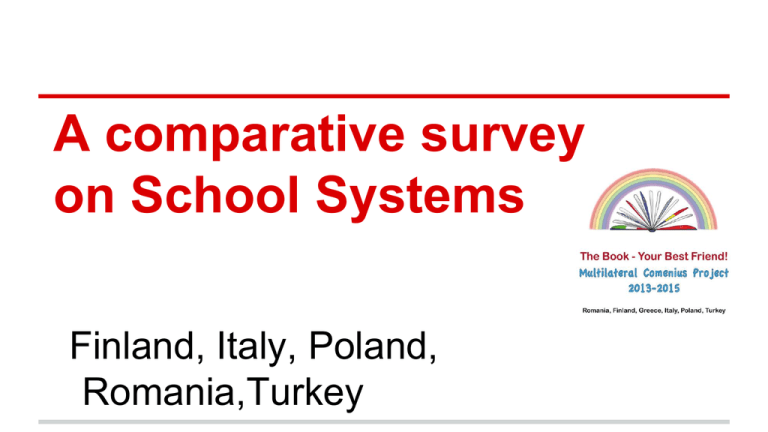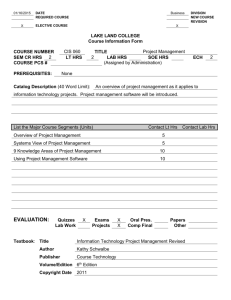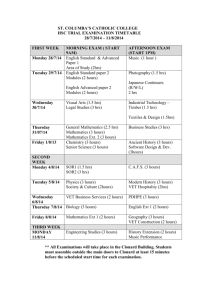A comparative survey on School Systems
advertisement

A comparative survey on School Systems Finland, Italy, Poland, Romania,Turkey Compulsory School Students start school at the age of 6 and they continue until they graduate from junior secondary school (at the age of 16). If a student is over eighteen and still hasn’t graduated from junior secondary school, they can leave without graduation. Compulsory School (stages) Primary school: 6-13 years of age Junior secondary school: 13-16 years of age After graduating from junior secondary school most students continue their education in of the following: Liceum ogólnokształcące (general upper secondary school) 3 years Technikum (technical upper secondary school) 4 years Zasadnicza szkoła zawodowa (basic vocational school) 3 years Szkoła policealna (post secondary non-tertiary school) 2 years After graduating from the first two types of school (and passing national school leaving exams) students can continue studying at colleges or universities Private or State School State run school chosen by 95 % of students Private schools are chosen by only 5% of students and the fees are about 100-130 Euros per month (it depends on the city and the school itself) Avarage No of students in classrooms Usually there are about 20-30 students in a class. It depends on the school. There are also subjects (such as English or IT) where students are divided into groups and have classes separately (if a class is over 25 students) Mandated subjects: Primary and junior secondary school Stage 1 (grades 1-3, primary school): early school education (including: mother tongue education, social education, natural sciences education, mathematical education, technology education, foreign language education, education in music and arts, computer education, physical education). Stage 2 (grades 4-6, primary school): Polish language, History and civics, Modern foreign languages, Mathematics, Natural science, Music/ Art, Technology, Computer classes, Physical education, lessons with class tutor. Stage 3 (grades 1-3 of the gimnazjum): Polish language, History, Civic education, 2 Modern foreign languages, Mathematics, Physics, Chemistry, Biology, Geography, Art/ Music, Technology, Arts class, IT, Education for safety, Physical education, lessons with class tutor. Mandated subjects: secondary school General upper secondary school: Polish language, 2 foreign languages, History, Civic education, Culture studies, Mathematics, Physics, Chemistry, Biology, Geography, Introduction to entrepreneurship, Information technology, Physical education, Education for safety, lessons for class tutor, lessons for additional subject teaching envisaged in the curriculum at advanced (extended) level. Technikum: Polish language, 2 modern foreign languages, History, Civic education, Cultural studies, Mathematics, Physics, Chemistry, Biology, Geography, Introduction to entrepreneurship, Information technology, Physical education, Education for safety, lessons for class tutor, subjects at advanced level, theoretical vocational training, practical vocational training . Basic vocational school: Polish language, modern foreign language, History, Civic education, Mathematics, Physics, Geography, Biology, Chemistry, Introduction to Entrepreneurship, IT, Physical Education, Education for safety, theoretical vocational training, practical vocational training, lessons for class tutor. Annual Curriculum No of lessons (hrs) per day/per week The school year comprises around 180 days and is divided into two terms. The number of lessons in particular schools is as follows: Stage 1 (grades 1-3, primary school): 3-4 hrs per day/ 22-23 hrs per week* Stage 2 (grades 4-6, primary school): 4-6 hrs per day/ 29-30 hrs per week* Stage 3 (grades 1-3, gimnazjum): 6-8 hrs per day/ 34 hrs per week* Stage 4 (upper secondary schools): 6-8 hrs per day/ 35 hrs per week* *The actual number of lessons depends on the character of the school, extended subjects chosen by students and extra-curricular activities School day organisation, Teachers’ responsibility School day usually starts at 8:00 and it finishes at about 3:00 (there are some schools where classes last longer). One lesson lasts for 45 minutes. After each class there is a ten-minute break. Around 12:00, there is a longer (20-minute) lunch break. Students bring packed lunch or they can eat it at a school canteen. Teachers are responsible for students during lessons. They cannot remove a student from the classroom if he/she causes problems. During breaks teachers guard school corridors according to a plan which is prepared before the school year starts. Exams At the end of the 6-year primary school (age 13) – general, obligatory test with no selection function; the entry for the test enables pupils to start education in the gimnazjum; it provides pupils, parents as well as both schools, i.e. the primary school and the gimnazjum, with information about the level of achievements of the pupils. At the end of the 3-year lower secondary school, (age 16) – general, obligatory examination. The exam is based the core curriculum. It consists of three parts: Humanities (History, Civic education and the Polish language), Mathematics and Natural Sciences (including Biology, Chemistry, Physics and Geography) and a Modern Foreign Language. The results of the exam together with the final assessment of the pupils’ performance determine the admission to upper-secondary schools. At the end of upper secondary school, except for vocational schools (age 19-20)- final/matriculation examinations (egzamin maturalny). The liceum ogólnokształcące, and the technikum may issue świadectwo maturalne (a certificate for those who took and successfully completed the final examination, which is required for admission to higher education). The upper secondary school leaving examinations are national external exams. The matura examination (egzamin maturalny), entitling pupils for admission to higher education is made up of two parts: external written (prepared and assessed by Regional Examination Commissions) and internal oral (assessed by school teachers). Evaluating Standards Evaluation marks, tests Marks range from 1 to 6, where 1 is the worst (unsatisfactory) and 6 is the best (excellent) During each term students receive marks for: Oral answers Written tests (big ones after a unit of the curriculum and small ones concerning a particular isuue) Taking active part in lessons Homework Extra activities (participation in competitions, projects etc.) Those marks are taken into account at the end of each term, whereas the second term determines if and with what results a student is promoted to the higher grade. A student is promoted to a higher grade if he/she has received “acceptable” marks or above for all compulsory subjects at the end of the school year. In the case of one "unsatisfactory" mark the pupil can take an exam in this subject. A pupil who is not promoted and has not passed the exam has to repeat the same grade. (There is also a possibility of a conditional promotion of a pupil with one "unsatisfactory" mark only once during the educational cycle upon the consent of the teachers’ council). Teacher’s working hours a week Teachers’ working week is 18 hours at school which they get paid for. Moreover, all teachers are obliged to organise one or two „social” classes a week according to the students’ needs. In addition to those twenty hours inside the classroom, teachers must be available twenty more hours from Monday to Friday (afternoon meetings, school discos, trips etc). Teachers’ evaluation There are two separate ministries in Poland: Ministry of National Education and Ministry of Science and Higher Education. The Ministry of National Education is responsible for nearly the whole system of education, with the exception of higher education which is under the supervision of the Minister of Science and Higher Education. National educational policy is developed and carried out centrally, while the administration of education and the running of schools, pre-school institutions and other educational establishments are decentralized. The responsibility for the administration of public kindergartens, primary schools and gymnasia has been delegated to local authorities (communes). It has become the statutory responsibility of powiaty (districts) to administer upper secondary schools, artistic and special schools. The provinces (voivodships) have the coordinating function, supervising the implementation of the policy of the Ministry and being responsible for pedagogical supervision. The inspection of teaching standards in schools comes directly under the Ministry of Education and is represented by a regional administrative body (kuratorium).







